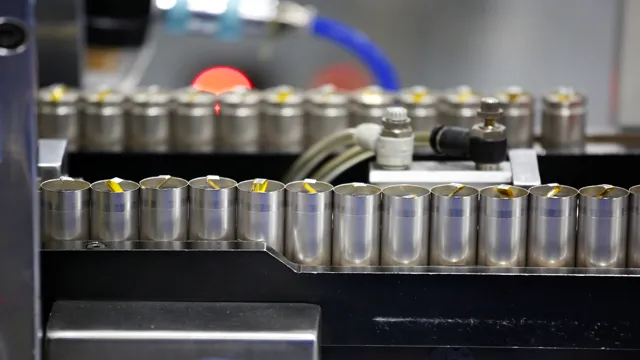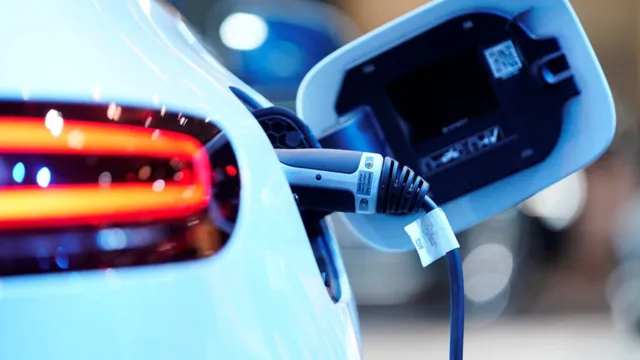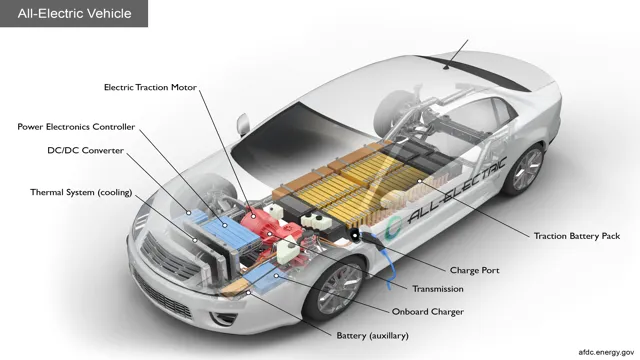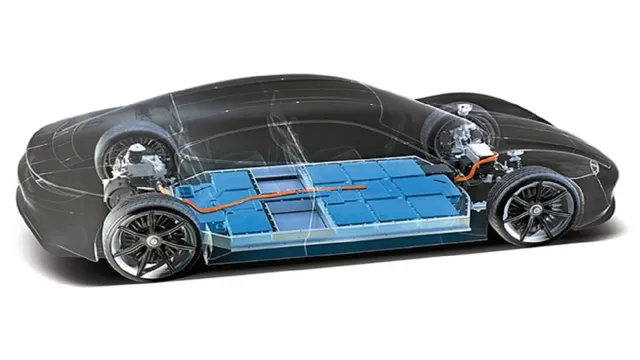Revolutionizing the Auto Industry: The Truth About Electric Car Batteries and Co2 Emissions
Electric cars have been touted as the eco-friendly alternative to gas guzzlers, but what about the batteries that power them? Recent reports have highlighted the carbon footprint associated with electric car batteries and the impact they have on sustainability. While these batteries are essential for the operation of electric vehicles, they do raise concerns regarding the production process and the materials used to make them. Are electric car batteries really sustainable, and how can we reduce their impact on the environment? Let’s delve deeper into the topic of electric car batteries, CO2 emissions, and sustainability.
What is the CO2 Footprint of Electric Car Batteries?
When people think of electric cars, one of the first things that comes to mind is their environmental friendliness. But what about the production of the batteries that power these vehicles? It’s estimated that the production of electric car batteries results in a higher CO2 emissions footprint compared to the production of traditional car engines. However, these emissions are offset over the lifespan of the battery and the car.
The amount of emissions saved during the car’s use and the longer lifespan of the electric car battery compared to traditional car engines makes up for the initial higher emissions. Additionally, advancements in battery production are making them more environmentally friendly, with companies using renewable energy sources to power their production plants and implementing more efficient production processes. So, while electric car batteries do have a CO2 footprint, their environmental benefits still outweigh the costs in the long run.
Examining the Production Process
Electric car batteries have been promoted by many as the future of sustainable transportation. But as with any production process, it comes with a carbon footprint. What environmentalists are scrutinizing is whether electric car batteries are worthy of such a claim.
In essence, the production process of electric car batteries indeed emits high levels of CO2 and leaves a considerable carbon footprint. The lithium-ion batteries that power electric cars require a range of materials such as nickel, cobalt, and lithium, and mining them requires a significant amount of energy. The mining, refining, and manufacturing phases of batteries contribute to their large carbon footprint.
Nevertheless, it’s essential to note that electric cars emit far less carbon during usage, making them a better alternative to traditional fuel-powered vehicles.

Life Cycle Analysis of Batteries
When it comes to the environmental impact of electric vehicles, the question of the CO2 footprint of batteries often arises. To properly assess this, a Life Cycle Analysis (LCA) of batteries must be considered. This means taking into account the production, distribution, use, and disposal of batteries.
While the production of batteries does create some carbon emissions, studies have shown that the overall carbon emissions associated with battery production are much lower than those associated with traditional fossil fuel vehicles. Additionally, as electric vehicles are driven, they emit far less carbon than traditional vehicles, leading to a smaller overall carbon footprint. At the end of the battery’s life, proper recycling and disposal can further reduce the environmental impact.
In conclusion, while electric vehicle batteries do have a carbon footprint, it is far lower than traditional fossil fuel vehicles and can be further reduced through proper production, use, and disposal practices.
How do Electric Car Batteries Impact the Environment?
When it comes to the environmental impact of electric cars, the batteries they use are a significant consideration. It’s true that electric vehicles produce fewer emissions than their gas-guzzling counterparts, but manufacturing their batteries involves a significant carbon footprint. That being said, it’s important to consider the entire life cycle of an electric car battery.
While producing the battery does emit a lot of carbon, the battery can be reused or recycled, lowering the overall carbon footprint. Additionally, as technology improves, manufacturers are finding more efficient and sustainable ways to produce batteries, further reducing their environmental impact. So, while the impact of electric car batteries on the environment may not be perfect, it’s certainly a step in the right direction.
Reducing Emissions from Manufacturing and Disposal
Electric car batteries have certainly revolutionized the transportation industry, but their environmental impact is a growing concern. Traditional car batteries are made of lead and sulfuric acid, which is highly toxic, but electric car batteries are made from lithium-ion. While lithium mining can cause environmental harm, the bigger issue lies in what happens to the batteries after they are discarded.
If not properly recycled, the toxic chemicals in the batteries can leach into the environment, contaminating the soil and waterways. To combat this, manufacturers are working on making the batteries more recyclable and reducing the carbon emissions from their production. Additionally, some companies are exploring second-life applications, such as using them as energy storage for households or businesses.
While there is still progress to be made, it’s important to consider the lifecycle of electric car batteries and work towards reducing their environmental impact.
Addressing Supply Chain Challenges
As the electric vehicle market continues to grow, concerns about the environmental impact of electric car batteries are on the rise. While electric cars are emission-free on the road, the production and disposal of their batteries are not entirely green. The manufacturing of electric car batteries involves the extraction of raw materials, such as cobalt and lithium, which can have environmental consequences.
Cobalt mining, in particular, has been linked to child labor and environmental damage. Additionally, the disposal of batteries can lead to toxic chemicals leaching into the soil and contaminating water sources. However, the usage of rechargeable batteries in electric cars could significantly reduce carbon emissions over the lifetime of the batteries.
Thus, it’s crucial to ensure the ethical procurement and disposal of raw materials used in these batteries.
Advancements in Battery Recycling
Electric Car Batteries Impact the Environment. The rise of electric vehicles has led to concerns regarding what happens to the batteries once the vehicles reach the end of their lives. The production of electric car batteries requires a significant amount of energy and resources, leading to a potentially large environmental impact.
However, advancements in battery recycling are providing hope for a sustainable future. Recycling electric car batteries allows for the recovery of valuable materials like lithium, cobalt, and nickel. This reduces the need for new mining operations, which can be destructive to the environment.
In addition, recycled batteries can be used for energy storage, further reducing the need for new production and the associated environmental impact. While there are still challenges to overcome, such as the cost-effectiveness of recycling, these advancements in battery recycling offer a promising solution for reducing the environmental impact of electric vehicles.
The Future of Sustainable Electric Car Batteries
Electric car batteries have come a long way in terms of sustainability, and the future looks brighter than ever. With every passing day, researchers are working hard to develop new technologies that will help us produce electric car batteries with minimal CO2 emissions. The demand for eco-friendly electric car batteries is on the rise, and this is driving the development of new and sustainable manufacturing methods.
One promising solution currently being explored is the use of recycled materials in battery production. Using recycled metals, for example, could significantly reduce the CO2 emissions that result from traditional mining methods. Additionally, innovations like solid-state batteries, which eliminate the need for toxic and flammable electrolytes, are also a step in the right direction towards sustainability.
As we move towards a greener future, the development of sustainable electric car batteries will play a crucial role in reducing our carbon footprint and preserving the environment.
Innovations in Sustainable Battery Materials
Sustainable Electric Car Batteries The world is constantly evolving, and with it, so are our modes of transportation. Electric cars are taking over the world, but a major challenge is the battery that powers them. However, there are new materials being developed that promise to revolutionize the future of electric car batteries.
These sustainable materials have the potential to improve the performance, range, and longevity of electric vehicles significantly. For instance, researchers are developing new types of lithium-ion batteries that use less cobalt, a material that is hard to source sustainably. Additionally, they are exploring the use of sustainable materials, such as sodium-ion, magnesium, and zinc-air batteries, which are cheaper, safer, and more environmentally friendly.
These advancements could help reduce the cost of electric vehicles and make them more accessible to a wider range of consumers. With these innovations, it’s no doubt that the future of electric car batteries is bright, and the world is set to become a greener place.
The Role of Government and Regulations
The role of government and regulations in the future of sustainable electric car batteries cannot be overstated. With the increasing adoption of electric cars and concern for the environment, governments around the world are implementing policies to promote the use of sustainable electric car batteries. Regulations have also been put in place to ensure that these batteries are safe for use and their disposal does not harm the environment.
In addition, governments are providing incentives to manufacturers to develop more sustainable batteries that are affordable and efficient. This has led to research and development in the industry, resulting in the production of batteries with longer lifespans, faster charging times, and improved energy densities. The future of sustainable electric car batteries is promising, and with the support of governments, it is likely to continue to grow and benefit both the environment and consumers.
Final Thoughts on CO2 and Electric Car Batteries
Electric car batteries have often been praised for their environmentally-friendly qualities, mainly because they don’t emit any harmful pollutants when in use. However, the production of these batteries requires a significant amount of energy and resources, which release CO2 emissions into the atmosphere. By switching to more sustainable manufacturing processes and using renewable energy for production, the CO2 emissions can be reduced.
It’s also important to consider the lifespan of the batteries and their disposal, as improper disposal can release harmful chemicals into the environment. While there is still a long way to go in terms of creating truly sustainable and eco-friendly electric car batteries, it’s clear that they are a big step in the right direction towards a cleaner future.
Conclusion
In conclusion, while electric car batteries do have a CO2 footprint in their production, this impact is minimal compared to the emissions saved from driving an electric vehicle. It’s like worrying about the footprint of a single step when taking a marathon towards a cleaner future. So let’s keep charging ahead towards a sustainable transportation system that is not only emission-free but also efficient, affordable, and stylish! #GoElectric”
FAQs
How do electric car batteries reduce CO2 emissions?
Electric car batteries reduce CO2 emissions by powering the car with electricity instead of fossil fuels, which emit large amounts of CO2.
Are all electric car batteries made the same way?
No, there are several types of electric car batteries, including lithium-ion, nickel-metal hydride, and lead-acid batteries.
Can electric car batteries be recycled?
Yes, electric car batteries can be recycled. The materials used in the batteries, such as lithium and cobalt, can be recovered and reused.
How long do electric car batteries last?
The lifespan of electric car batteries varies depending on factors such as usage and maintenance, but many manufacturers offer warranties for up to 8 years or 100,000 miles.



